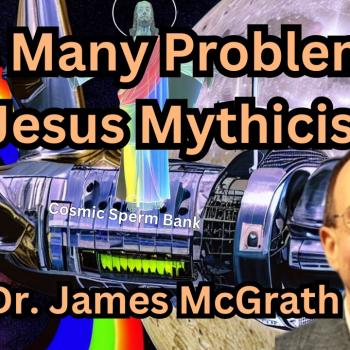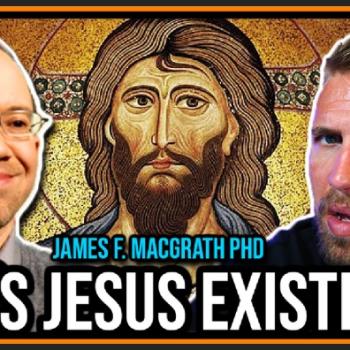As I unwisely allowed myself to get dragged into a conversation on another blog with someone whose behavior led to him being banned from this one, I was struck again by the difficulty that many mythicists seem to have with distinguishing between the question of Jesus’ existence, and the question of whether certain ancient sources, and/or certain contemporary apologists, make accurate claims about that ancient figure.
And so of course my thoughts turned to the bacterial flagellum.
I’ve made comparisons between mythicism and movements like Intelligent Design, since there are similarities both at the level of the big picture and on specific details.
But here’s a difference that may be equally instructive. When atheists opposing Intelligent Design proponents hear them cite the bacterial flagellum as evidence of a Designer, they don’t counter by insisting that the bacterial flagellum doesn’t (or probably doesn’t) exist.
Why not? In most instances they haven’t seen this microscopic object. Indeed, the extent to which our tools can allow us to “see” them is itself a less-than-straightforward matter, making it very interesting in its own right.
But staying on the central point for the present, why do atheists trust the scientists rather than suggesting that the thing their studies bring to light probably doesn’t exist, because it is appealed to by ID proponents? It would be easier to simply deny its existence altogether than to engage in the more complex argumentation needed to argue (on the basis of its existence) that ID proponents interpret its significance incorrectly.
Hopefully the point here is obvious. The fact you disagree with someone’s interpretation of a person or object does not have any bearing on whether the person or object exists. If the case they make seems compelling initially, or seems completely bogus right away, has no bearing on whether the person or thing their case is made about exists.
In the discussion that led to this post, I was asked if I am “sure” Jesus existed as a historical figure, and if so why. I tried to give a short answer as follows:
“Sure” is relative. I’m as confident as one can be for a figure in the ancient world who did not mint coins or erect edifices on which he placed inscriptions about himself.
The shortest argument (which, like a short argument for anything, may not seem persuasive unless it is expanded on) is this:
– the anointed one descended from David referred to the king and the restoration of that line to the throne
– being executed by the Romans before establishing one’s throne disqualified one’s claim to be the one to restore the Davidic dynasty to the throne
Therefore
– It is less likely that early Christians invented from scratch a crucified anointed one and went around trying to persuade their fellow Jews to accept him, than that there was a figure that they believed to be this messiah who was then executed, and they managed to maintain that belief despite the cognitive dissonance resulting from this counterevidence.
Can one make an argument that is even shorter than this, while still keeping it relatively persuasive?
The ongoing discussion there has kept illustrating the similarities. They appeal to scholars who are persuaded by the evidence that there is a historical Jesus, but who offer criticisms of aspects of the field’s methods and argue for better ones, in exactly the same way that ID proponents quote mine biologists who are persuaded that evolution occurred, but disagree with their peers and advocate for improved methods. They also look around and as long as they can find a scholar who has proposed a particular view, they are happy to treat it as though it were more probable than alternatives, and to combine minority views together into an edifice that is at least as unlikely as its component pieces, if not indeed more so because the convergence of so many unlikelihoods may be more unlikely than any one or even several of them would be!
I also said the following in response to a comment that shared a recent video by Richard Carrier:
The fact that mythicists can say that Jesus of Nazareth is merely:
- Enoch
- Philo’s Logos
- A combination of different people named Jesus
- Tammuz
- Horus
- Julius Caesar
- A figure crafted through what they mislabel “midrash”
and so on indicates that this method is completely bankrupt. It amounts to picking any known source or individual(s) and then adding “and Jesus was invented on that basis.” Which, of course, one could do with any other comparable figure in precisely the same way.
I would write a book about this, perhaps pitching it more broadly as being about how to identify pseudoscholarship. It seems to be needed in our day and age more than ever. And yet the discussion over on that blog makes me wonder whether it would accomplish much. But presumably the fact that some people stubbornly persist in denialism should never be allowed to persuade us not to make a case in an attempt to reach others (and perhaps, just maybe, even the truly die-hard true believers in false beliefs)?
Of related interest, Christoph Heilig has responded to the book review that engaged with his use of Bayes’ Theorem. Here’s an excerpt (the full thing is worth reading, and includes an illustration from the modern-day political realm):
The point about Bayes’s theorem offering access to the “best” possible result should not be mistaken as a reference to precision but to completeness of evidence taken into account. To formulate it more clearly this time: if we are comparing two hypotheses in light of some new evidence and we can’t tell which of the two had been more plausible before the new evidence emerged (prior-probability) and if we can’t tell which of the two hypothesis makes the evidence more predictable (likelihood), we simply can’t say anything about which of the two hypotheses is more probable (“probable” refers here to the subjective “confidence in the truth of [the hypothesis] H. How much would you be willing to bet on the truth of H?”, Hidden Criticism, p. 28).
Meanwhile, Phillip Jenkins discussed Philo’s account of the Carabas incident and how it relates to the Gospels. Also, Ben Witherington’s series, mentioned several times already, continued. See too:













